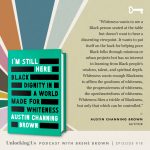Shame is not a vehicle for social justice
I was listening to Brene Brown’s Unlocking Us podcast this summer. Black Lives Matter momentum was back up following the death of George Floyd. I remember Brene explaining how shame rarely helps solve complex problems. Shame, instead, often causes people to get defensive and avoid the problem at hand. Brene shared:
“Being held accountable and feeling shame is not the same thing as being shamed.”
Her words hit me hard. It made me realize…
Feeling shame is not the same as being shamed.
Shaming people will not help us solve the daunting 400-year old problem of racism and white supremacy. At the very moment we need white people to step up as allies, shaming Whites is prevalent in the news cycle and social media. Shaming someone does not facilitate positive change. Shaming white people for the actions of past generations or their own unintended actions prevents healthy discussions about racism.
It is not that white people are innocent. We do need to feel the shame that comes with hard things like racism. White guilt for the actions of ancestors is real. White guilt for the things you have said and done to unknowingly support racism is normal. We all have participated in the systems that keep people down and others up in the social hierarchy.
It is time to acknowledge our mistakes if we want real social change.
Defensiveness
When someone feels shame, it triggers the fight or flight response in our brain – run, freeze, or fight. All of these automatic responses are deeply unhelpful to have a productive conversation about race.
As a white woman in the U.S., I have supported the systems of racism. I live in a very white-dominated community, I have voted for people that support white supremacy, and I have believed that racism was a thing of the past. I used to say I was “color blind.”
I was wrong.
I can acknowledge my role, but it has taken me many years to be able to step up. I have read dozens of antiracism books, researched books of my own about allyship for people different from you, and gotten a lot of candid feedback on how to be more inclusive.
We all need allies to help us along the way
Austin Channing Brown’s book I’m Still Here is one of my favorite antiracism books. Her stories are poignant and heartfelt. Austin was also on Brene’s podcast and said:

Furthermore, she said, “nice people participate in the systems that support racism all the time. Much like I did, it is inherent in our day-to-day activities – schools, housing, voting rights, and in segregated communities. This does not make you a bad person or a racist. It means you are collaborating with the system unless you are actively doing things to fight the system.”
Shame & the White Male Retreat
I thought about the battle for racial equity and how long it has taken for us to get to a place where we can even say Black Lives Matter. Why will so many people still not acknowledge racism exists? What will it take to solve this problem?
We cannot solve the problem of racism without the support of decision makers. 92% of CEOs of Fortune 500 companies are white men. 70% of the U.S. Congress is made up of white men. We need them involved. At the same time, white men are feeling shame and withdrawing from the conversation.
What will it take to engage white men in antiracism?
Ideas to engage White men in the racism conversation:
-
Ask them about their own experiences feeling different or feeling like they did not belong somewhere. We all have a diversity story. This elicits vulnerability and empathy.
-
Be curious to understand their own experiences with racism. Have they had Black friends or family members? Perhaps they do not understand the issues because it has not affected them personally, or perhaps they could see it through someone else’s eyes to understand.
-
Affirm that they are not a bad person. That we all are key to solving this problem. It feels good to help others different from ourselves.
If you liked this post, check out my Next Pivot Point podcast. We have over 100 interviews with diversity, equity, and inclusion leaders all over the world. Be an ally and leave a review on iTunes – it helps other allies find it.

